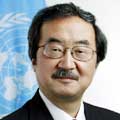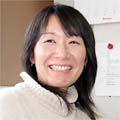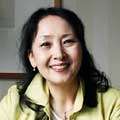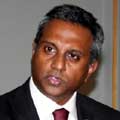What can be done to promote a greater interest in peace?
Last summer I had the opportunity to interview UN Secretary-General Ban Ki-moon. When I asked how he would rate the state of peace in the world, in terms of a percentage, he replied: "If we do our best, we can reach 100%." What, then, is the United Nations now doing to realize this state of 100% peace in the world? And what can children do to advance this effort?
Around the world, there are children who suffer as victims of war and conflict. In some places, child soldiers are involved in the fighting. However, many of my peers don't have much awareness when it comes to peace issues. What can be done to promote a greater interest in peace among junior high school and high school students? (Masaya Obayashi, 15)
|

(Photo courtesy of the United Nations Information Center) |
Learning, discussing human rights
Kiyotaka Akasaka,縲 Under-Secretary-General for Communications and Public Information |
|
縲縲縲縲縲縲縲縲 What is the UN doing for peace?
縲縲縲縲縲縲縲縲The United Nations, which is composed of all sovereign states in the world, works for peace every day. It does this through many different ways. These include preventive diplomacy - to prevent disputes from arising between parties, or getting worse; peacemaking - bringing hostile parties to agreement through peaceful measures; and peacekeeping - the deployment of a UN presence in the field. There are currently 16 peace operations deployed around the world with more than 120,000 personnel. The United Nations has also strengthened its early warning systems as well as efforts to consolidate peace in countries emerging from conflict. The Secretary-General also uses his "good offices" for the resolution of conflicts and to implement decisions by the Security Council. At the same time, the UN works to secure justice and protect human rights, and promotes social progress and better standards of life for all as essential aspects of the maintenance of international peace and security.
縲縲縲縲縲縲縲縲What can we, as children, do to help?
縲縲縲縲縲縲縲縲Learn about your rights and help other children at home and in other countries understand and realize their rights, which include the right to education, freedom from abuse, and a right to be heard. There are so many ways to get involved in creating positive changes in the world - through volunteering, non-governmental organisations, your studies, and your own creativity and individual efforts. Take part in a Model United Nations and learn about other nations and people and what we have in common. You can start by visiting the site of the United Nations Information Centre in Tokyo (www.unic.or.jp/) and learning about UN activities in Japan.
縲縲縲縲縲縲縲縲What can we do to heighten interest about peace among junior high and high school students?
縲縲縲縲縲縲縲縲Share your ideas and talk to your friends and teachers about how you can make a difference for a better world. The United Nations is making it easier for you to interact with us through social media, and to learn about and share our work for peace. You can inform yourself by visiting our website (www.un.org), and by joining us on Facebook (http://www.facebook.com/unicnetwork縲and縲www.facebook.com/UN.Japan). You can visit our channel on YouTube (http://www.youtube.com/user/unitednations); follow us on Twitter (http://twitter.com/#!/un); and download UN news and ways to help others onto your mobile devices with apps like the one by the UN Foundation (http://www.unfoundation.org/mobileapp). We also have special resources for you, like games, contests and campaigns. For example, you can experience what it's like to be a refugee by playing "Against All Odds" (http://www.playagainstallodds.com/); plan for tsunamis and other natural disasters through a simulation game http://www.stopdisastersgame.org/en/home.html; and play a video game about how to respond to hunger crises http://www.wfp.org/how-to-help/individuals/food-force. You can also learn about disarmament, listen to stories of the Hibakusha, and, if you hurry, can enter the "Poetry for Peace Contest" (http://www.un.org/disarmament/special/poetryforpeace/). You can also go on a webquest about child soldiers (http://cyberschoolbus.un.org/childsoldiers/webquest/); and join the fight against racism (http://www.un.org/en/letsfightracism/). Most importantly, you should keep up your good work, sowing the seeds of peace!
|
United Nations The United Nations was established in October 1945 in order to promote peace, economic development, and social progress in the world. The number of member nations currently stands at 193. We reported on the United Nations in the article "Working at the United Nations," appearing in issue 62 of Peace Seeds, and our "Interview with UN Secretary-General Ban Ki-moon" was featured in issue 75.
Kiyotaka Akasaka, 63 Mr. Akasaka was born in Osaka in 1948. After graduating from Kyoto University, he began working at the Ministry of Foreign Affairs in 1971. He has served as Japan窶冱 Ambassador to the UN and Deputy Secretary-General of the Organization for Economic Cooperation and Development (OECD), among other posts. In April 2007 he was appointed to his current position.
|
|
What is Japan's role in the world?
For issue 18 of Peace Seeds, "Building Peace," I attended a workshop organized by Rumiko Seya. It was my first opportunity to learn about disarmament issues.
I imagine the problems occurring in conflict areas have something in common with problems we face in our everyday lives, such as the problem of bullying. The best way to arrive at a solution is through dialogue, but in reality, that can be very difficult.
What about current conditions involving child soldiers? Have you had an opportunity to make use of your experience at JCCP for the people affected by the great earthquake in eastern Japan? What do you see as Japan窶冱 role in the world? (Shotaro Takata,17)
|

(Photo courtesy of the JCCP) |
Sharing the experience of reconstruction
Rumiko Seya,縲 Secretary General of Japan Center for Conflict Prevention (JCCP) |
|
縲縲縲縲縲縲縲縲 With regard to both global concerns, such as conflict, and the challenges of our own human relationships, there is often regret over things that should have been done at the time, but it can be very difficult to find the right course in the midst of these situations. In both kinds of cases, it's possible to repair minor damage at an early stage, but once there are wide rifts or the damage is severe, it becomes an irremediable problem, despite our great regret. Therefore, it's vital to settle disputes before they grow too serious.
縲縲縲縲縲縲縲縲Sadly, even today there are child soldiers in several countries, including Somalia, the Congo, Colombia, and parts of the Middle East. At the same time, we have seen some progress, such as an increase in the number of nations that have signed laws banning the conscription of children, and, Darfur, the armed insurgents that agreed to return their child soldiers.
縲縲縲縲縲縲縲縲What I see as a commonality of the reconstruction efforts involving the damage from the earthquake in eastern Japan and the damage suffered in conflict areas is that it's important to make clear the things local residents can do, the things only the national government can do or should do, and the things the private sector can do to share in the efforts and fill in the gaps. I have found that if the enthusiasm and support from outside parties is too strong, including when it bleeds into the kinds of things local residents can do for themselves, this can hinder the people of these affected areas from becoming fully independent. By the same token, if the government is involved in things that the private sector can do, that will be a drag on efforts to promote reconstruction.
縲縲縲縲縲縲縲縲Rebuilding a society takes a long time. But it's true that some countries in Africa, seeing the reconstruction work in Japan after its own disaster, have been impressed with such efforts and they have made requests for Japan to teach these methods of reconstruction.
縲縲縲縲縲縲縲縲While there has been an increase in the number of African nations that have rebounded from conflict or poverty and are now experiencing economic growth, I think the opportunity exists for Japan, a country that has undertaken reconstruction efforts due to war and natural disaster, to build new relationships with such nations of the world as equals.
|
Rumiko Seya, 34 Ms. Seya was born in Gunma Prefecture in 1977. After receiving an MA in Conflict Resolution from the University of Bradford in the U.K., she served as an NGO staff member in Rwanda, involved in the rehabilitation of former child soldiers and peace building efforts; a UN volunteer in Sierra Leone; special assistant to the Ambassador of the Japanese Embassy in Afghanistan; and a member of the UN staff in Côte d'Ivoire. She became secretary general of JCCP in April 2007 and published the book "Watashi no shokugyo wa busokaijo" ("My Mission is Disarmament") in September 2011. She appeared in issue 18, "Building Peace," and was the columnist for the Peace Seeds series called "Peace Classroom."
|
|
What can we do for peace?
I interviewed Miho Cibot for issue 83, featuring "Peace Karuta." I was impressed with the fact that she has thought long and hard about peace issues. Since then, I have been trying to think of things from a variety of angles and look for common ground.
Ms. Cibot, what do you think children can do to help make a more peaceful world? And what should adults convey to children about peace? (Mei Yoshimoto,15)
|
 |
Imagining a peaceful world
Miho Cibot,縲 peace activist in France |
|
Hearing about wars in the past and seeing what's happening in the world today sometimes makes me feel helpless, and I doubt my own efforts. If even adults like me think that way than children like you probably feel this more strongly. However, the presence of children alone has great power. Imagine the world without a single child in it. This would mean that the human race could do nothing but wait for its own extinction. It's because there are children that we do our best to go on and keep our eyes on a brighter future.
縲縲縲縲縲縲縲縲I ask children to imagine what a peaceful world would look like. Even if it starts as a dream, if you use your head and move forward, advancing toward this dream, others who can join you in addressing today's problems will surely appear. As individuals, our strength may be small, but when we come together, and pass on our power to the next generation, that can produce a great force. I imagine you, as junior writers, have already had that experience. I remember when Peace Seeds first began. Originally, the plan was to publish these newspapers for just a short time, but then a year passed, and now the newspaper has reached its 100th issue. This is the result of your efforts to convey stories that leave a strong impression on readers. I've had the opportunity to watch former junior writers mature and display their strengths. At these times, I窶冦 encouraged to keep doing the best I can, too.
|
Miho Cibot, 61 Ms. Cibot was born in Shizuoka Prefecture in 1949. She moved to France in 1975 and established the Hiroshima-Nagasaki Research Institute in 1982. She is now an adviser for Mayors for Peace France (AFCDRP). Also a poet, she received an award for her tanka poetry from the Asahi Shimbun newspaper in 2000. For Peace Seeds, she was featured in the first installment of "Hiroshima in the World" and appeared in issue 16, "The Power of Animation to Promote Peace in the World," and issue 80, "Handing Down Hiroshima."
|
|
Proposing a summit on human rights
I met Salil Shetty last November, at the 2010 World Summit of Nobel Peace Laureates. Mr. Shetty told us about children's rights violations, such child labor and children receiving the death penalty. As one measure to address these problems, we proposed in Peace Seeds to hold a summit to exchange views on human rights. What do you think of this idea? What do you think children can do to help realize peace in the world? (Saaya Teranishi, 15)
|
 |
The power of youth can bring change
Salil Shetty,縲 secretary general of Amnesty International |
|
縲縲縲縲縲縲縲縲 Thank you for your letter regarding the role of children in achieving peace. It was a pleasure to meet you and your fellow students at the 2010 World Summit of Nobel Laureates held in Hiroshima.
縲縲縲縲縲縲縲縲As I said when we met, young people truly have the power to create change. Your ideas of holding a youth summit at the UN and adding human rights programes to school curricula are valuable and I encourage you to act on them.
縲縲縲縲縲縲縲縲You asked what peace really means; this is a basic but difficult question, with many different answers. Amnesty International believes that central to peace is the recognition and realisation of all human rights for all people so that they may live in dignity and without fear.
縲縲縲縲縲縲縲縲Children are the future and have a key role to play in working together to build a world in which peace, dignity and tolerance are the basic foundations. Amnesty International will continue to work with young people towards goals, and we fully support your own admirable ambitions to promote peace and human rights in Japan.
|
Salil Shetty, 50 Mr. Shetty was born in India in 1961. He has served in his current role since July 2010. Amnesty International, established in 1961, is an international human rights organization which engages in research and lobbying activities with regard to human rights. Awarded the Nobel Peace Prize in 1977, the organization maintains its secretariat in London. Amnesty International was featured in issue 81, "Protecting Children's Rights."
|
|
|